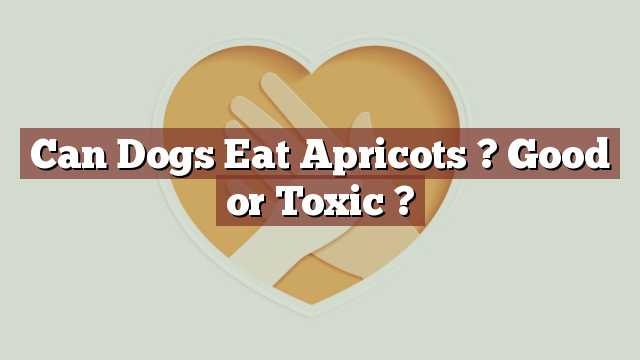Can Dogs Eat Apricots? Good or Toxic?
As pet owners, it’s essential to know which foods are safe and healthy for our furry friends. One common question that arises is whether dogs can eat apricots. In this article, we will explore the nutritional value of apricots, safety considerations, potential risks or benefits, what to do if your dog ate apricots, and conclude with some tips on moderation and cautious monitoring when it comes to dogs eating apricots.
Nutritional Value of Apricots for Dogs: Vitamins, Minerals, and Fiber
Apricots are small, orange fruits that belong to the Rosaceae family. They are packed with essential vitamins, minerals, and dietary fiber, making them a nutritious choice for humans. However, when it comes to dogs, it’s crucial to understand how these nutrients can affect their health.
Apricots are an excellent source of vitamins A and C, which are essential for maintaining a healthy immune system, promoting good vision, and supporting cell growth and repair. They also contain potassium, which helps regulate blood pressure and supports proper muscle function.
Furthermore, apricots are rich in dietary fiber, which aids digestion and helps prevent constipation in dogs. Fiber also contributes to a healthy weight management and can help regulate blood sugar levels.
Can Dogs Eat Apricots? Safety Considerations and Toxicity Risks
Can dogs eat apricots? While apricots can offer certain health benefits, it’s important to exercise caution. Apricot pits, also known as kernels or seeds, contain amygdalin, which can release cyanide when metabolized. Cyanide is toxic to both humans and dogs. Therefore, it is crucial to remove the pit before offering apricots to your dog.
Moreover, some dogs may have sensitivities or allergies to apricots. Signs of an allergic reaction can include itching, skin redness, swelling, or gastrointestinal distress. If you notice any of these symptoms after your dog consumes apricots, it’s best to consult a veterinarian for further advice.
Potential Risks or Benefits of Dogs Eating Apricots: Digestive Issues, Allergies, and More
While most dogs can safely consume apricots in moderation, there are potential risks associated with their consumption. The high sugar content of apricots may lead to digestive upset, such as diarrhea or upset stomach, especially if your dog overindulges.
Additionally, the consumption of apricot pits can be extremely dangerous for dogs. Cyanide poisoning can cause symptoms such as difficulty breathing, vomiting, seizures, or even death. Therefore, it is crucial to keep apricot pits away from your furry friend.
On the other hand, the fiber content in apricots can aid digestion and promote regular bowel movements in dogs. It can also contribute to their overall gastrointestinal health. However, it’s important to introduce apricots gradually into your dog’s diet and monitor their reaction.
My Dog Ate Apricots: What to Do? Watch for Symptoms and Seek Veterinary Advice
If you discover that your dog has consumed apricots, it’s important to observe them for any signs of distress or discomfort. Watch for symptoms such as vomiting, diarrhea, abdominal pain, difficulty breathing, or seizures. If any of these symptoms occur, it is crucial to seek immediate veterinary assistance.
It is always better to be cautious and consult a veterinarian if you have any concerns about your dog’s health after consuming apricots. They will be able to provide appropriate guidance and recommend any necessary treatments.
Conclusion: Moderation and Cautious Monitoring for Dogs Eating Apricots
In conclusion, dogs can eat apricots but with several important considerations. While apricots offer various nutrients and fiber that can support your dog’s health, it’s crucial to remove the pit to avoid potential cyanide poisoning. Additionally, some dogs may be allergic to apricots, so it’s important to monitor their reaction.
Furthermore, moderation is key when it comes to feeding apricots to your dog. Too many apricots can lead to digestive issues due to their high sugar content. Always introduce new foods gradually and observe your dog’s response.
Remember, if you have any concerns or your dog exhibits any unusual symptoms after consuming apricots, it’s best to seek veterinary advice. By practicing moderation and cautious monitoring, you can ensure your furry friend enjoys the nutritional benefits of apricots safely.
Thank you for investing your time in exploring [page_title] on Can-Eat.org. Our goal is to provide readers like you with thorough and reliable information about various dietary topics. Each article, including [page_title], stems from diligent research and a passion for understanding the nuances of our food choices. We believe that knowledge is a vital step towards making informed and healthy decisions. However, while "[page_title]" sheds light on its specific topic, it's crucial to remember that everyone's body reacts differently to foods and dietary changes. What might be beneficial for one person could have different effects on another. Before you consider integrating suggestions or insights from "[page_title]" into your diet, it's always wise to consult with a nutritionist or healthcare professional. Their specialized knowledge ensures that you're making choices best suited to your individual health needs. As you navigate [page_title], be mindful of potential allergies, intolerances, or unique dietary requirements you may have. No singular article can capture the vast diversity of human health, and individualized guidance is invaluable. The content provided in [page_title] serves as a general guide. It is not, by any means, a substitute for personalized medical or nutritional advice. Your health should always be the top priority, and professional guidance is the best path forward. In your journey towards a balanced and nutritious lifestyle, we hope that [page_title] serves as a helpful stepping stone. Remember, informed decisions lead to healthier outcomes. Thank you for trusting Can-Eat.org. Continue exploring, learning, and prioritizing your health. Cheers to a well-informed and healthier future!

